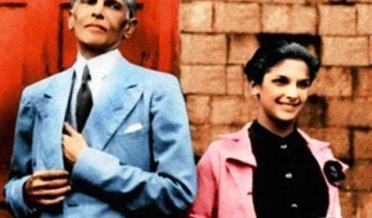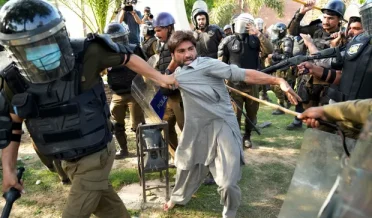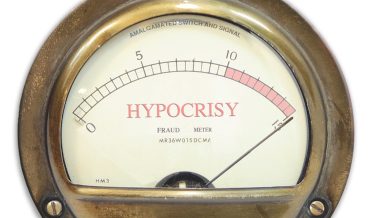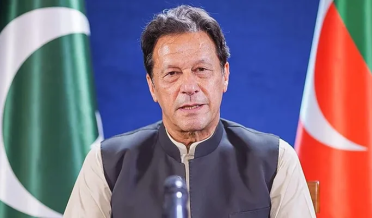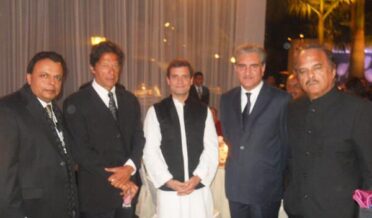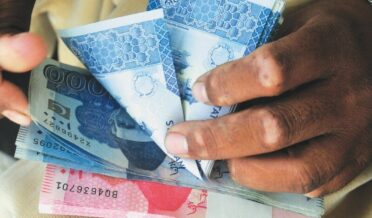Whoever wins in the confrontation between the former prime minister and the army, both sides are to blame for trying to gag criticism

Hamid Mir
Iam not a big fan of Imran Khan. I have long criticised Pakistan’s former prime minister, but now it is becoming difficult to do so. There is a de facto ban on referring to him in the media, meaning we are no longer allowed to mention his name or show his picture. Pakistani TV channels are not allowed to interview him or air his statements. This is the result of a series of directives issued by the media regulator.
As prime minister, Imran Khan tried to turn Pakistan from a struggling democracy into an autocracy. His successor, Shehbaz Sharif, appears to be following in his footsteps.
Once upon a time I was one of Khan’s favourite journalists (despite the fact that I advised him in 1995 not to go into politics). When I was banned from broadcasting my talkshow in 2007 by the Musharraf regime, Khan stood by me. He used to participate in my roadside shows and aggressively criticised the anti-media policies of a military dictator. When I survived an assassination attempt in 2014, Khan told the media: “Hamid Mir is my favourite TV anchor.” Then, in 2018, he became prime minister.
The next year, an interview I had conducted with former president Asif Ali Zardari was pulled from the air. The media regulator under Khan’s watch also banned former prime minister Nawaz Sharif’s speeches from being aired on Pakistani media. I criticised him when his government allowed the trial of civilians in military courts under the Pakistan Army Act.
In 2021, a blanket ban was imposed on me (again) in electronic and print media after I gave a speech against the attacks on our colleagues. There was no written order against me from any court or from the media regulator, but I remained banned in Pakistan from May 2021 to March 2022. I blamed the military establishment for that ban. Khan remained silent on my disappearance from the media.
Now Imran Khan is out of the government. I am back on the TV screens, and Khan is missing from the media. I want to speak about his mistakes, but I cannot do so without mentioning his name and using video clips. Owners of some prominent TV channels and newspapers were reportedly told by the military authorities recently that enough is enough. Khan has been declared an “irresponsible” politician and an “enemy” of the army after the 9 May riots that followed his arrest earlier this year. They don’t want to see his name or picture in the media. They don’t want to see any dissenting voices in the media criticising the military courts.
The national assembly of Pakistan passed a resolution on 12 June demanding speedy action against 9 May rioters under the army act; Shehbaz Sharif had already declared Khan to be the “mastermind” behind the violence. Khan says he has no doubt that he will be tried in a military court and jailed.
His problem is that he overestimated his popularity, blindly confronting the most powerful institution in the country. He failed to organise peaceful rallies. His violent supporters actually undermined their leader on 9 May. The attitude of an angry, fast bowler was good on the cricket ground but the same attitude in the field of politics pushed him towards a disaster. It is Khan v the army, and it’s clearly the latter that is winning.
History repeats itself quickly in Pakistan, with variations, but my principles must stay the same. I cannot support the censorship of Imran Khan because I opposed the same censorship of Nawaz Sharif when Khan was in power. I can never endorse the disappearance of journalists perceived as being pro-Khan, such as Imran Riaz, because I was also banned when Khan was in power. I cannot remain silent on a crackdown by the current regime against the critical voices because I was also a victim of the same crackdown in 2020.
Imran Khan may be arrested again soon. The regime wants to remove him from electoral politics but cannot rid his name from Pakistan’s discourse, as if he never existed. I think they are not fighting against Khan, they are actually fighting against the very idea of a democratic Pakistan. It’s time for all Pakistani rulers to quit their censorship habit.


